- Home
- Jessie Haas
Chase Page 4
Chase Read online
Page 4
Right enough—the words rang and echoed in Phin’s head and he nearly ran—everything in him wanted to, and it took violent effort to stay still. “Can the beast fly?” Mr. Lundy had asked, and the man said, “He can about fly, right enough….”
The oat bin banged open in the other aisle. Dennis was feeding. The mule dealer led his horse into the stall, and Phin could breathe again. He listened to the sound of unsaddling. Dennis brought oats, exchanged a few words with the mule dealer, clumped up the stairs over Phin’s head. Hay shushed down through the trapdoor, and the stallion crunched his supper to the rhythmic swish of brush on silken hide.
Then just eating sounds; nothing human. Phin wouldn’t have guessed the man was still in there. Time stretched; the darkness thickened. Phin’s mouth was dry, his throat was dry, he was hungry, he ached all over, and it all felt loud, as if hunger and thirst droned inside him, blocked his hearing—
A little sound; creak of leather, flap of a stirrup fender thrown up over the seat. The mule dealer was saddling again. As regular as the breaker whistle for the last three weeks he’d made his appearance at Murray’s around now, to eat a sandwich and sip a small whiskey. He never rode there. He always walked.
The stall door opened. The mule dealer came out, closed and latched it, and turned toward the stairs.
Phin sat like a stone. In a moment the boards creaked above him. Dust filtered onto his face. He heard footsteps in the upper story of the barn; then nothing.
Or…a rustle? A swish. After several minutes the stallion snorted, a big sound from this horse who usually kept the silence of a wild animal. Saddle leather creaked. “Good lad.”
He was in there again. But how?
The only way was the hay hole. He must have dropped through that small trapdoor and landed in the saddle—but why? Who was he?
Lantern light grew and bobbed along the walls. As the mule dealer let himself out of the stall, Dennis came around the corner.
He stopped short. Light swung high as he lifted the lantern. “Something wrong?”
“No, all set.”
Dennis took a step closer. “Leavin’ his clothes on?”
“Aye, I may go out again shortly.”
Dennis grunted. It was a sound that could mean anything. “Thinkin’ you’ll be in a hurry?”
“I may be in some haste.”
The grunt again. “Bridle on, too, eh? Easy to steal him like that. Well, I had a notion to sit out front and smoke a pipe tonight. That’ll be a relief to you, won’t it—knowin’ the door is watched?”
“Aye,” the dealer said, and that, too, could mean anything. He walked away down the aisle. Dennis followed, the light receding by jerks. Phin clenched his fists, then splayed his fingers as wide and straight as they would go, a silent scream in the dark. What was going on?
A board creaked in the upper floor of the barn. Footsteps paused at the top of the stairs, moved on. From above the stall came a sound of cloth rubbing against wood; then nothing.
Phin strained to hear. Did the man know he was here? What was he? Not a mule dealer, not really. He must be some kind of spy.
A Pinkerton agent? Banks and railroads hired the famous detective agency to catch robbers. Maybe the mine companies had, too.
If this man was a Pinkerton, was that good for Phin, or bad? Would he be viewed as a murderer or a witness?
It didn’t matter, he decided, which seat he had in the courtroom. If he was tried, he’d be convicted. If he testified against Plume, he’d be murdered. Dead either way.
The dark thickened and grew velvety. Mice stirred. Cold crept in, and the rich scent of pipe tobacco, good enough to eat. Smells of pork and cabbage drifted from the nearby houses. Phin hugged himself and endured.
After a while, noiselessly, he picked up the package beside him, reached through the worn spot in the paper, and drew out a chunk of folded bills, with a tiny rasping sound like a mouse chewing. He pushed the money deep in his pocket, and left the wallet in the chaff.
Out in the dark a train hooted, like a distant owl. A glow of lamplight warmed the end of the aisle. Dennis must be harnessing the team.
Phin turned on his stomach and oozed, snail-like, from under the stairs. He stood up; new aches and bruises unfolded along his arms, legs, back, reminding him sharply of his fall down the Dog Hole. He stretched up, then down. A joint popped, and the stallion stepped to the stall door.
Shh, Phin thought, heart pounding. He’d been heard—but that tiny pop couldn’t reach upstairs, could it?
The door latch rattled, a hoof thumped wood as the stallion reached over the half door. Phin couldn’t see him—just a blacker shade of dark—but he knew the head would be reaching, sharp ears pricked, for that extra handful of oats Phin had so often given him.
He crossed the aisle. A velvet muzzle sought his palm, nipping when there were no oats. Sweet, hay-scented breath blew in his ear. Phin shivered.
Good-bye, he mouthed, and went down the dark aisle.
Bang! The stallion kicked the wall. It sounded like a gunshot.
Shocked, Phin blundered into a shovel and sent it clattering. Horses snorted and whinnied and stamped, and Phin ran out the front door into the lantern-lit yard.
The team was only half hitched. Swearing, Dennis fought to fasten the second tug as the gray horse swung wide, shoving, almost trampling him. Phin hesitated, torn between helping and the bushes so invitingly black, the back of the wagon yawning before him, a box, a trap, a hiding hole….
Hooves thundered down the barn aisle. Phin dived up into the wagon, rolled head over heels to the front, and flattened behind a tarp as the stallion galloped out the barn doorway. The rider bent over his neck, long coat billowing out behind. The horse lengthened in a run, up the street toward the depot.
8
TRAIN TO MEET
“Whoa! Now stand—I mean it!”
The horses plunged, making the wagon lurch. Under cover of the noise, Phin drew the tarp over him and lay flat, pressed to the front of the wagon box.
“There now, you old fool—there! What do you think you’re going to do, catch him? Now back, back—” A big sigh; Dennis must have fastened the second tug. He kept up a low growl to them as he climbed onto the seat. It sank and squeaked above Phin’s head, and the wagon started with a jolt.
“Walk now, walk—all right by jing, trot if you’re a mind to! What’s goin’ on around here? Sell up and head west—got a good mind to! That boy never—And who is he? Mule dealer, my eye! Easy, now!”
Should he speak? Phin wondered. An old cuss; that’s what Dennis was. He kept his kindness for cats and horses, and a little, unsuspected until today, for Phin. How far would Dennis go for him? Best not to find out; stay quiet, keep the favor nearly accidental—
“Now what’s he doin’?”
Rub-a-dub rub-a-dub—galloping hooves on the road ahead. Near Phin’s face was a rough C-shaped chink of light in the front of the wagon. A knot in the board; heat and sun had shrunk and loosened it. He jabbed it out with his thumb, making a tiny oval window on the lamp-lit street.
Too late. The horseman had passed already—passed and turned and came up beside the wagon.
“Seems I’m going away for a few days,” the mule dealer said. “Want to pay my shot in case I don’t get back. What do I owe you?”
“I don’t carry my figures with me,” Dennis said. “You’ll have to come to the office.”
“No time for that. Here—this should more than cover it.”
The wagon checked slightly as the money changed hands; Phin heard the stallion breathing. “Obliged,” Dennis said in an unobliged voice. “You’ve waited this long—why don’t you stay till morning?”
There was no immediate reply. The stallion danced beside the wagon, a foot away from Phin.
“What do you think about this murder?” the mule dealer asked.
“Don’t know much about it.”
“The lad worked for you.”
“You think Ph
inny did it?” Dennis asked.
“I don’t mind admitting that I have my doubts.” The mule dealer’s voice was light and nearly laughing. “But I’m a dubious man by nature.”
Nearby came the great hoot of the train whistle. “Here she is, right on time,” Dennis said, raising his voice. “The Ladybird, bound for Mauch Chunk and points north.”
That was for Phin. It wasn’t the kind of thing Dennis would say otherwise. Points north. He’d thought of himself as going west, but north would do—
“What’s this?” the mule dealer asked.
Now Phin heard voices ahead, and through his knothole saw the shapes of men. They blurred in the wagon’s bounce. Five? A dozen? Twenty? The hair prickled on the back of his neck. They’d found him, the lynch mob. They were coming—
The wagon abruptly halted, the body lurching against the pole and rebounding slightly. The group of men steadied in the knothole’s frame and there were only three, one to hold each of Dennis’s horses, one walking toward the wagon.
The seat screaked as Dennis stood up. “Limpin’ Moses, let go of that team, Mahoney, you tin-plate excuse—”
A tall, broad-shouldered shape approached the wagon box. The face came into bright lamplight.
Plume.
Heat flashed on Phin’s skin. A cold fist of fear knotted his stomach. Yet he was glad to see Plume. So handsome in the moonlight and lantern light, and hadn’t he saved Phin’s life? Spared it, anyway. “This one I can’t do.”
And there was this. Four people on earth knew—knew—that Phin was innocent. One was Ned Plume.
Who said to Dennis, in a dangerous, vibrant voice, “Where is the little rat?”
“If you mean Phinny—”
“You know who I mean.”
“I ain’t seen him.”
“I want him,” Plume said, ignoring the radiant honesty of Dennis’s voice. “He’s taken something from me.”
“A murderer and a thief,” Dennis said. “Boy’s had a big day!”
Plume’s eyes seemed to flare. He went very still. “I’ll take no lip from you, Dennis. He has my pocketbook, and he’s taken something else besides.”
“No man likes to be parted from his money,” Dennis said, voice bristling like the back of an angry dog. “You least of all, I hear.”
Plume said, “That wallet’s worth the lives of six men.”
Mahoney’s head jerked in surprise. That shouldn’t have been said, except in a low voice at one of Murray’s back tables. Plume’s eyes glittered with drink and fathomless rage; a dangerous man, loosed from self-restraint, yet master of his body, swift to act and react. His friends would be careful in their speech, down at Murray’s. Phin would bring the next drink quickly, and quickly efface himself.
But Dennis wouldn’t heed these signals. He was fearless himself by long habit, like a terrier or a bantam rooster. He’d say something dangerous; there was nothing he could say that wasn’t dangerous. Phin drew his legs under him, ready to hurl himself over the side and run. Draw them off Dennis—he could do that, anyway. Maybe he’d even get away—
“Why would the lad still be around?” The mule dealer; mild, friendly sounding. “If he murdered a man, he’d be on the run, wouldn’t he? And if he’s got your wallet, Plume, he’s got the wherewithal to run a long way.”
Plume’s body relaxed slightly. “That he does.”
“What else has he taken?” Yes. Phin wanted to know that too, as he lay with legs half bent, between run and stay.
“That’s no man’s business but my own,” Plume said in a cold, level voice. At the horses’ heads, Mahoney yawned like a nervous dog.
“Well, you gents settle in and enjoy your little chat,” Dennis said. “I’ve got freight to haul and a bed I’d like to climb into before sunup.”
Plume turned his head toward the station. “That’s the Ladybird, isn’t it? People I should talk to up line.” He sprang onto the seat beside Dennis. “Mahoney, hop on! When we get there, hold her a minute. A couple of messages I’ll need to be sending. Mac, you too.”
Behind Phin, boots rapped on the bare wood floor of the wagon. Dennis said something angry. Footsteps came toward Phin. A boot crunched down on his shin, slid off it, drew back and kicked his leg out of the way like a piece of firewood.
A muttered conversation ensued. Phin heard none of it. His shin felt on fire, as if it must be dripping blood. Sick, dazed, he lay against the wagon front, clenching his teeth, struggling not to groan.
The wagon stopped. He heard the mighty shh and sss of the steam locomotive. The wagon jounced as Mahoney jumped off and ran to catch the engineer. In a moment Plume and the other man were gone. Rap of boots on the platform; light prance and champ of the stallion moving on somewhere.
Phin flexed his leg. It moved. Hurt; hurt worse than his arm this morning, even, but it moved.
“Your freight’s in, Dennis,” a new voice said. “Half ton of sacked western oats—”
“I’ll just swing around,” Dennis said, and started the wagon again with a jerk. Phin felt it make a wide arc away from the platform. He put his eye to the knothole. Coal cars were being pushed up the track to make the end of this mixed train. A passenger car. A plump man in a long coat walked the platform. Plume and the man Mac stood with their heads close together, Mac listening hard.
“Whoa,” Dennis said, and went on conversationally. “Phinny, if you’re there—freight car half open behind you, and you won’t find a better chance. Grab that sack in the corner. If you ain’t there, I’m a fool like everybody else in this forsaken hole—but I ain’t lookin’, so I won’t know. Now go!”
Phin groped in the corner with one cold hand, found what felt like a flour sack. He siezed it, thrust back the tarp, and leaped low over the side of the wagon. His leg would either hold him or it wouldn’t. He’d find out when he landed.
9
HOLD OR FOLD
He hit the ground awkwardly and stumbled upright, not sure, for a moment, if he could take another step. His leg had a decision to make; fold, because his shinbone seemed to be breaking in half, or hold.
It held. Hurt, and held. He hobbled to the black opening. The floor of the car was chest high and smooth, and his first try at getting in amounted to a feeble hop.
“Hey Dennis,” a voice called. “Move it, will you? They need to pull up—”
He’d lose his cover. Phin threw the flour sack into the car and scrambled after it, hooking his elbow on the edge of the door to haul himself up. His hurt shin scraped across the lip of the doorway; small bright pain-lights flared in his head.
He rose to his feet. The bundle had loosened inside his shirt, and biscuit crumbs rolled down his ribs. In front of him his own shadow loomed up the back wall, a crippled giant. He scooped up the sack, dodged into the pitch black beyond the light, and banged into another wall; stacked crates, filling half the car.
With a sigh and rumble the train began to creep toward the platform, toward Mac and Mahoney and Plume.
Phin felt frantically up the crate cliff. Above his head he found the top. He threw his sack up; it fell back on him; he threw it harder and higher and climbed after it, finding tiny finger-and toeholds in the sides of crates and boxes. The train lurched gently as he flung himself over the top, groping for his sack.
It was nowhere in reach. He rose on his knees and bumped his head on the ceiling. Crawl, then. Reach, crawl—
His right hand came down on nothing, and his arm plunged up to the shoulder into nothing.
He drew back with a gasp. A hole between crates—he felt around its edges. It was narrow, not like the Dog Hole. He couldn’t have fallen in. But with a whole railcar to choose from, the flour sack had. It had been knobby, and landed with a promising thump. There must have been food in it; lost.
The train stopped with a deep metallic squeal. Yellow lamplight came in the door now, and Phin heard voices. This car was at the platform, and he was up here with no place to hide. The boxes were packed level, a broa
d, flat plane stretching toward the door.
Voices, louder, closer; Phin curled in the back corner, pulled his cap down, and turned his face to the wall. He and Jimmy had learned by the age of five—hide your face, hide your eyes. It’s the eyes that give you away.
Hoofbeats again. He’d been haunted all day by the horse and Engelbreit. The horse, at least, he’d soon leave behind—
“Never heard of such a thing!” said an unknown voice.
“I find that hard to believe.” The mule dealer, just outside the door. “Surely from time to time a man needs to transport a horse.”
“Then they wait for a stock car!” The speaker sounded peppery.
“As it happens, it’s this very now that I need to travel, and on this very car that I’ll go. Unless you’d rather explain to the gentleman who signed this pass—”
“This railroad gives no free passes!”
“Then that’s not his signature?”
A seething silence. The horse snorted and stamped. Free pass, Phin thought. So this man worked for the mine owners. They and the railroad owners were the same class, sometimes the same people. The mule dealer, as he styled himself, must be a Coal and Iron policeman, or a Pinkerton agent.
“Oh, very well—Bill, Jamie, bustle! This gentleman needs a ramp and bait for the horse, and a bucket, and—I don’t know what all, but get it and hurry! We’re holding trains all up and down the line!”
A moment later the door rumbled wider.
Phin waited numbly. In a moment they’d discover him. It all had been for nothing—
A thump. Footsteps on the bare floor. Hay rustled, and a man said, “Oh, it’s blowin’ right out his ears, the steam! Ye can fair see it!”
Holding his cap low over his face, Phin risked a glance toward the light. The men were close, but he couldn’t see them. He was too high, too far back. Below the wall of crates they were only voices.
If he couldn’t see them, they couldn’t see him.
And that meant—there was a heavier-sounding thump as they laid a ramp up to the open door—that meant that he wasn’t discovered after all. Not yet.

 Chase
Chase The Sixth Sense
The Sixth Sense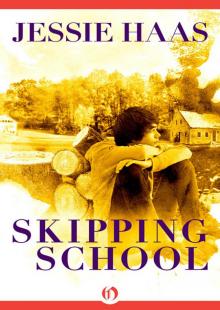 Skipping School
Skipping School Keeping Barney
Keeping Barney Unbroken
Unbroken Westminster West
Westminster West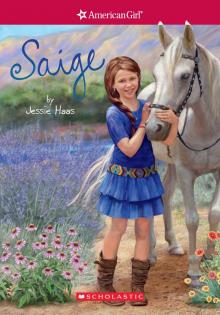 Saige
Saige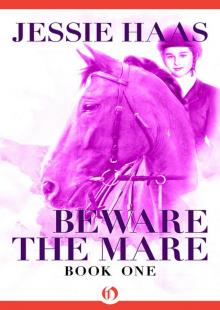 Beware the Mare
Beware the Mare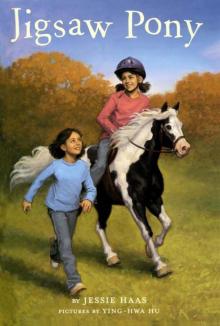 Jigsaw Pony
Jigsaw Pony Rescue
Rescue Saige Paints the Sky
Saige Paints the Sky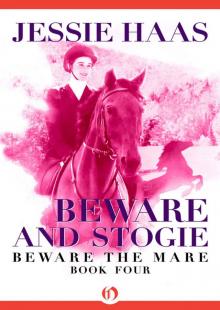 Beware and Stogie
Beware and Stogie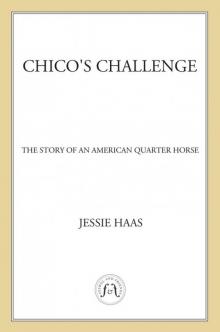 Chico's Challenge
Chico's Challenge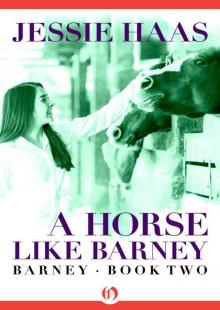 A Horse like Barney
A Horse like Barney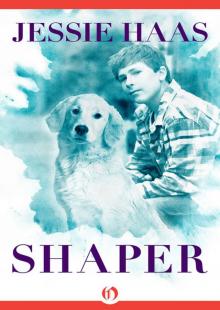 Shaper
Shaper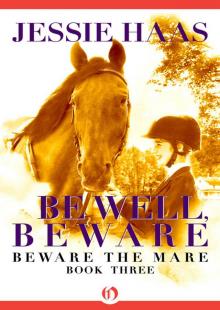 Be Well, Beware
Be Well, Beware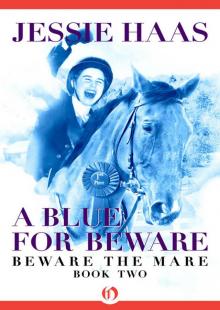 A Blue for Beware
A Blue for Beware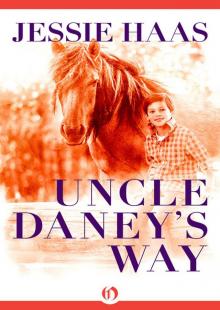 Uncle Daney's Way
Uncle Daney's Way